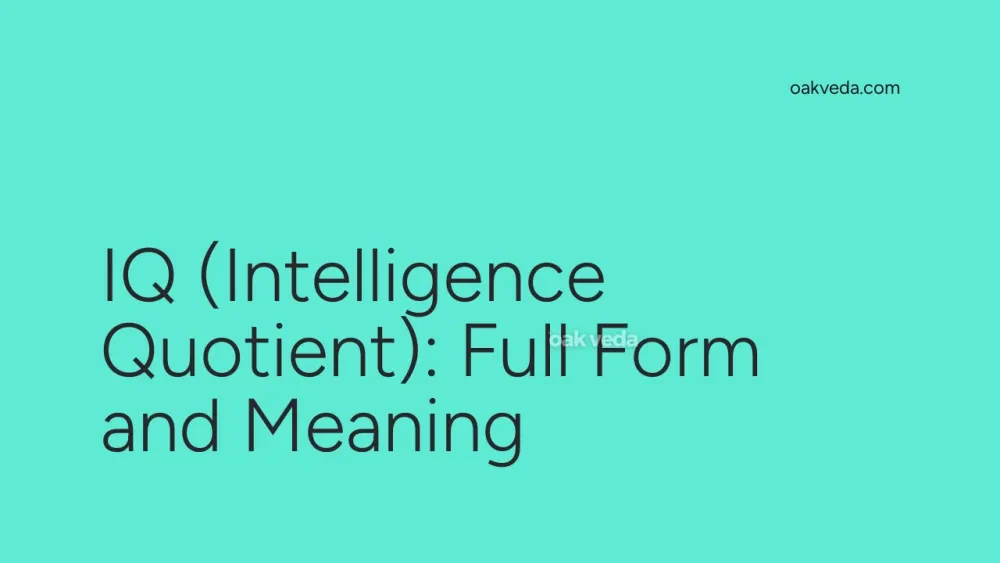
What is the Full Form of IQ?
The full form of IQ is Intelligence Quotient. This widely recognized abbreviation represents a standardized measure of human cognitive abilities and potential. IQ tests are designed to assess various aspects of an individual's mental capabilities, providing insights into their problem-solving skills, logical reasoning, and overall intellectual capacity.
What is Intelligence Quotient?
Intelligence Quotient, commonly known as IQ, is a numerical score derived from standardized tests that aim to measure human intelligence. These tests evaluate a person's cognitive abilities across various domains, including verbal comprehension, perceptual reasoning, working memory, and processing speed. The resulting score provides a relative measure of an individual's intellectual capabilities compared to the general population.
Origin and Development of Intelligence Quotient
The concept of IQ has a rich history dating back to the early 20th century:
- In 1905, French psychologists Alfred Binet and Théodore Simon developed the first modern intelligence test.
- German psychologist William Stern introduced the term "Intelligence Quotient" in 1912, deriving it from the German word "Intelligenzquotient."
- Stern proposed calculating IQ by dividing a person's mental age by their chronological age and multiplying the result by 100.
- Over time, IQ tests evolved to include various subtests and standardized scoring methods.
How does Intelligence Quotient work?
IQ tests typically consist of a series of tasks designed to assess different cognitive abilities. The scoring process involves:
- Administering standardized tests to a large sample population.
- Establishing a normal distribution of scores, with 100 as the average IQ.
- Setting the standard deviation at 15 points above or below the mean.
- Comparing an individual's performance to this standardized scale.
Most modern IQ tests use the Wechsler Adult Intelligence Scale (WAIS) or similar instruments to evaluate cognitive abilities across multiple domains.
Types of Intelligence Quotient Tests
Several types of IQ tests are used for different purposes and age groups:
- Wechsler Intelligence Scale for Children (WISC): Designed for children aged 6-16 years.
- Stanford-Binet Intelligence Scales: Suitable for individuals aged 2-85+ years.
- Kaufman Brief Intelligence Test (KBIT): A quick screening tool for ages 4-90 years.
- Raven's Progressive Matrices: A non-verbal test focusing on abstract reasoning.
- Culture Fair Intelligence Test: Designed to minimize cultural and linguistic biases.
Functions of Intelligence Quotient
IQ tests serve several important functions:
- Educational Assessment: Identifying students who may need additional support or advanced learning opportunities.
- Career Guidance: Helping individuals choose career paths that align with their cognitive strengths.
- Clinical Diagnosis: Assisting in the identification of cognitive impairments or developmental disorders.
- Research: Studying the relationship between intelligence and various factors such as genetics, environment, and education.
Applications of Intelligence Quotient
IQ scores find applications in various fields:
- Education: Tailoring teaching methods to students' cognitive abilities.
- Psychology: Diagnosing intellectual disabilities or giftedness.
- Human Resources: Assessing job candidates' problem-solving skills.
- Neuroscience: Studying brain function and cognitive development.
- Social Sciences: Investigating correlations between IQ and socioeconomic factors.
Features of Intelligence Quotient
Key features of IQ include:
- Standardization: Scores are normalized to allow meaningful comparisons.
- Reliability: Well-designed tests produce consistent results over time.
- Validity: IQ tests aim to measure genuine cognitive abilities.
- Multifaceted Assessment: Evaluates various aspects of intelligence.
- Age-Adjusted Scoring: Accounts for expected cognitive development at different ages.
Benefits of Intelligence Quotient Testing
IQ testing offers several benefits:
- Identifies cognitive strengths and weaknesses.
- Helps in educational and career planning.
- Aids in diagnosing learning disabilities or intellectual giftedness.
- Provides a standardized measure for research purposes.
- Assists in developing targeted interventions for cognitive enhancement.
Limitations or Challenges of Intelligence Quotient
Despite its widespread use, IQ testing has limitations:
- Does not measure all aspects of intelligence, such as creativity or emotional intelligence.
- May be influenced by cultural factors and test-taking experience.
- Can be affected by temporary factors like stress or fatigue.
- Overemphasis on IQ scores may lead to labeling or stereotyping.
- Does not account for multiple intelligences theory proposed by Howard Gardner.
Future Developments in Intelligence Quotient Technology
The field of IQ testing continues to evolve:
- Adaptive Testing: Computer-based tests that adjust difficulty based on responses.
- Brain Imaging: Incorporating neuroimaging data to enhance cognitive assessment.
- Artificial Intelligence: AI-powered analysis of test results for more nuanced insights.
- Culturally Fair Tests: Developing more inclusive and unbiased assessment tools.
- Integration with Other Measures: Combining IQ with emotional and practical intelligence assessments.
FAQs on IQ Full Form
-
What is considered a high IQ score? Generally, scores above 130 are considered high, with 140+ being very high or genius-level.
-
Can IQ change over time? While IQ tends to remain relatively stable, it can change due to factors like education, brain injuries, or cognitive training.
-
Are IQ tests accurate for all cultures? Traditional IQ tests may have cultural biases, but efforts are being made to develop more culturally fair assessments.
-
How often should IQ be tested? For most people, infrequent testing (every few years) is sufficient, as scores tend to remain stable.
-
Is IQ hereditary? Research suggests that both genetic and environmental factors influence IQ, with heritability estimates ranging from 50% to 80%.
In conclusion, the full form of IQ, Intelligence Quotient, represents a complex and evolving measure of human cognitive abilities. While it provides valuable insights into certain aspects of intelligence, it's important to consider IQ as part of a broader understanding of human potential and capabilities.
You may be interested in:

